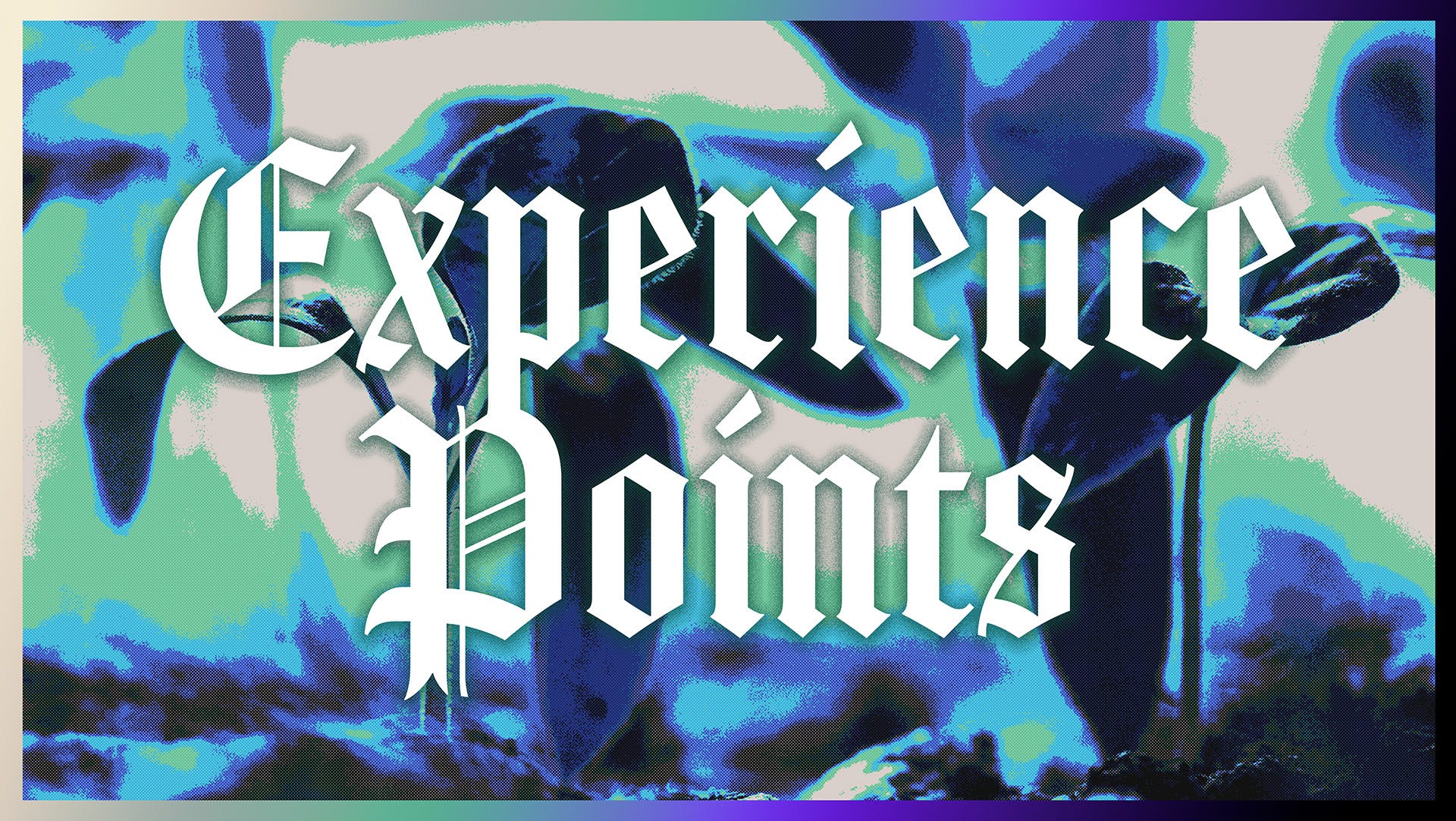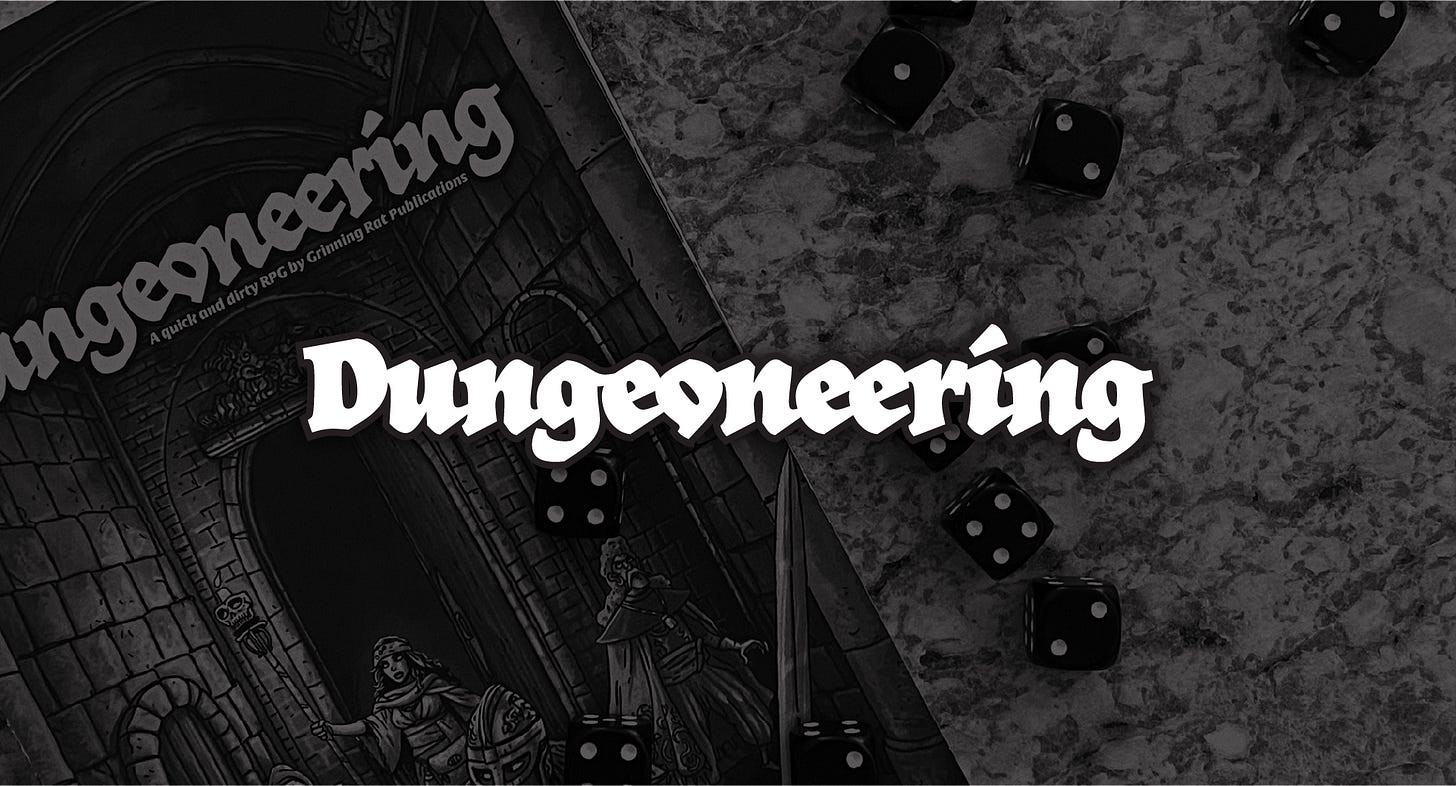We Can Do Better Than XP
Experience points were invented over 50 years ago. So why are they still the default assumption?
I’m not a huge fan of abstraction in games.
I’ve talked about it at length in other posts (here and here), so I’m not going to go into too much of a rant about where I think the shortcomings are. But the long and short of it is that while I don’t think we need to fully simulate a game’s world, there are things that lose value when we attempt to abstract too much.
One of the more egregious examples of abstraction in my mind is how to handle progression or advancement, level-ups, skill increases, stuff like that. Which is frustrating, because we have many, many different ways of handling those sorts of things than the traditional point system. Yet more and more we see games with really innovative systems still defaulting to a system that was invented 50 years ago.
I generally find that simply hitting a threshold of numbers to get new powers or more ability or whatever really unsatisfying. I find telling the players at the end of an arbitrary amount of effort “you level up” to be really unsatisfying. I find having to describe why this arbitrary action grants progress towards your skills but this other one which is logically similar doesn’t.
I just find the entire process to be really unsatisfying. So let’s talk about how to make it better.
Before we get into it, however, I want to mention that the following are just my thoughts. I’m not saying you need to do X, Y, or Z to make your games better. I’m just providing what I personally think would be better for me (and others like me) who want a more setting-first approach.
Unsurprisingly, you can probably expect that my approach to progression in Adamiir (my WIP dark fantasy setting / system) will be inspired by some of the things I mention here.
Background
Let’s start with the most basic progression system there is: experience points.
You may be surprised to learn that “experience points” as a term was invented for Dungeons & Dragons in the early 1970s. One could argue that the concept has an analog to how wealth and money functionally works in the real world, but the original concept of experience points was, as far as anyone can tell, invented for fantasy roleplaying games — specifically D&D.
When it came to naming the mechanical term for experience points, it was Lawrence Schick (one of TSR’s first hires) who offered the shorthand “XP”, because EP was already taken by electrum pieces.
Yes, you read that right: electrum pieces are technically older than experience points. Go figure.
In the early days, XP was awarded by killing monsters (offering minor gains) and claiming treasure (offering major gains). Notably you couldn’t earn more XP than your current level allowed, so the concept of leveling up twice in one sitting was completely forbidden (unless, as it goes in ODND, your DM allowed it).
This is, in its most basic form, how experience points in D&D have worked ever since. Killing monsters has always granted XP. Treasure has fallen to the wayside edition after edition, but many a journeyman DM has played with the idea of introducing some minor “gold-for-XP” subsystems in their 5th Edition games.
Deviations
This naturally splintered into a number of other subtypes of XP as more games with different goals and playstyles were released. The advent of computer roleplaying games (CRPGs) also helped to introduce more complex systems of progression that would have been unwieldy for paper play.
The three major deviations, from what I can find, are as follows:
Activity-based progression: Wherein a character performing a task is rewarded, whether they succeed or fail, with incremental gains that “add up” to a full level-up.
Games like Traveller, Call of Cthulhu, the Elder Scrolls video games, and a number of JRPGs like the SaGa and Grandia series do this.
Freeform character points: Wherein points are earned arbitrarily that can be applied to various skills and abilities a character has, rather than a traditional level-up
Games like GURPS, World of Darkness games, and the skill subsystem in the post-Fallout 3 games do this.
Cash-in / purchase points: Wherein an in-game or metacurrency is earned through play and then applied towards the “purchase” of new level-ups.
Games like Warhammer Fantasy Roleplay and the Soulsborne games do this.
There are, of course, other games that do different kinds of advancement that don’t neatly fit into any of the deviations above or a traditional XP system or even what I’m going to propose as my preferred way to handle progression.
Feel free to share other examples of such games in the comments.
Problems
From my perspective, the issue(s) with the major deviations and traditional XP method are threefold:
Most of them are arbitrary. Why do souls / blood echoes / spirit power make you more powerful in these games? Why does treasure convert to better chances at hiding in shadows? Why does shooting things allow me to place points in my bartering skills?
They reward a hyper-specific type of play. The old axiom of “players do what rewards them” rings true in all these systems. As does the other old axiom, “given the opportunity, players will optimize the fun out of a game”.
They distance the characters from the setting. NPCs and setting locations are treated in ways that feel, at best, tangentially related to the progression system and, at worst, simple vending machines to grant opportunities for said progression.
For many, these are non-issues. These are games, after all, and what are games but abstractions of real life?
For me, though, these are problems that confound me. If I’m in charge of the world and its characters, doesn’t it stand to reason that I want those things to matter more than simple advent calendars for the players to pop out at arbitrarily scheduled times?
To make matters worse, because these systems are so comparatively arbitrary, they actively get in the way or discount the other mechanics of the system. Language and culture becomes a byproduct of late capitalism, where they’re only means to an end. Things like lore and history become annoying puzzles to solve in order to get to “the real game”. All things outside the player characters become satellites to the party-centric universe, where they only exist to grant or delay rewards.
Effectively, the world becomes a skinner box and you as the GM become the scientist carefully tweaking parameters in a long, drawn-out experiment.
Diagesis
I mentioned how the GM should, at all times, maintain “kayfabe” and weave the illusion that everything from the character sheet, to the progression systems, to the purchase of a damn crowbar should be embedded in the setting.
One of the main critiques of such a setting-first system is how much time this takes and, while my personal feeling is “yeah, that’s the point”, I can somewhat understand how this would be annoying from some groups.
Take, for example, the conflict resolution mechanic in Dogs in the Vineyard by Vincent Baker.
NOTE: I’m well aware of the problematic nature of the game and commend Baker for pulling the game from purchase due to those elements. That said, the mechanics are worth talking about in spite of the game’s blatant “you as characters are always justified in your use of force against anyone, as you are chosen by God.”
Moving on …
This is a phenomenal piece of mechanic design, in which characters (the eponymous Dogs) can escalate a confrontation by adding more dice via poker-like mechanics which is represented in-game by a conflict escalating from talking to physical altercation ultimately to pulling out a knife or, god-forbid, a gun.
The problem is that this takes a really long time. If every situation with conflict involves the equivalent of playing an entire hand of poker, that is a slow system to play in. Too slow, many would say — including myself!
But there’s another little bit of beauty in this game in the form of Coats. Rather than regurgitate what the text says, I’ll just post the specific bit of content I’m referring to directly from the book:
Meanwhile, while you’re there learning and proving yourself, your family and your home town are making your coat.
It’s an honor and a point of pride to make a coat. Primary responsibility is your mother’s, your grandmothers’, your aunts’ and sisters’. If your coat is poor, it reflects badly on them foremost. The boys and men in your family are expected to help and participate, but to do what they’re told. The women are expected to have the skills necessary to oversee the project and coordinate the efforts of everybody else.
There’s a traditional party where everybody in your extended community who can and will comes to your parents’ house and puts a stitch in your coat. At the end of the party, all the men bless it (in whatever state of unfinish it is at the moment) with consecrated earth and laying on hands.
So toward the end of your two months’ training and initiation, you receive the package from home containing your coat and letters of blessing and well-wishing.
You’ll serve actively as a Dog for three or four years, usually, sometimes less and sometimes more— sometimes lots more— and your beautiful new coat won’t hold up. It takes a fierce beating in the field. It becomes the responsibility of the communities you serve to maintain your coat, patching, piecing, repairing, even replacing it as you need.
Some Dogs come out of their service with three or four coats, the earlier ones packed carefully away to preserve them. Some come out with only their original coat, and it’s torn and battered and ruined.
In later life, as you’re called to higher and higher sacred offices, you are always allowed to replace whatever vestments accompany your office with your old Dog’s coat, no matter how beat up it is. And if you end up in the Dogs’ Temple training and initiating new Dogs, your old coat is powerfully significant.
(Picture one of the Dogs’ teachers. His coat’s so faded and stretched across his shoulders that you can see his shirt through it. It has an old stain and a crude patch under his left arm. The boyfriend of the woman he loved stabbed him, so long ago, and he had to stitch his coat back up himself. How high in the esteem of the new Dog initiates he is! He regards them all with love, hope, and very mixed feelings.)
All of the above: typical case.
Some Dogs’ years of service are in communities where getting the people to stop murdering and screwing each other is hard enough, let alone them making you a beautiful piecework coat. These Dogs do the best they can. I imagine one with only a remnant of her original coat, reef-stitched to the back or around the arm of a normal wool or canvas coat like anybody might wear.
Some new Dogs don’t have families who’ll make them coats. They can’t go without, so sometimes their teachers in the Dogs’ Temple work together to make one. Sometimes such a coat will be made with just as much love as a family-made one, but often it’ll be just thrown together. There are also people in the Faith who make coats and send them to the Dogs’ Temple for whoever needs them, with a similar range of made-with-love to just-thrown- together.
Rarely, a new Dog will fall through the cracks and not get a coat, and have to fend for her or himself, like a character in an early playtest who stitched the rough silhouette of a dog’s head onto the back of his plain old wool coat. Again there’s a spiritual-intuitive component: somebody in the Dogs’ Temple watched this character do it, and let him be.
It was as it should be, for reasons known to the King of Life.
Now that’s a good progression system! A character, whether player or non, can at a glance see everything they need to know about any other character in the world based on the coat they wear. Every coat is a reflection of the character’s path they’ve chartered, the mistakes they’ve made, the hard-fought battles they’ve won.
This can then transfer to a great many things in-game:
Wounds (your coat is damaged)
Rumors (that character’s coat is stolen)
Rewards (she’ll sew a little patch in your coat)
Reputation (your coat shows decades of service)
Exploration (a dead man’s coat shows a crude map of their hometown)
and many others…
Another Take
In my article on pregenerated characters, I talked about Yazeba’s Bed & Breakfast — which also has a pretty interesting way of handling progression.
As a general note here, Jay Dragon is quickly becoming one of my favorite designers in the hobby due to their unapologetic approach to the exact kind of things I’m looking for in our games.
Both in Yazeba’s Bed & Breakfast and their upcoming Seven Part Pact (which I will absolutely be talking about in the near future), the games themselves offer a world for the players to travel to as guests, rather than as colonizers to make in their own image.
This is really great stuff that I can’t wait to see more of.
Nearly every component of the game has some sort of track or progression that, when filled up, unlock new things that continue the cycle. Characters have journeys, the Shelves have nooks that are filled with mementos, etc.
The way these are unlocked aren’t through arbitrary action, however. They’re done by specific accomplishments that all add to the overall experience of progressing. Which is ultimately what a game should be doing with its advancement system!
And, as I mentioned, once these things are accomplished they often lead to new experiences that follow the same methodology, effectively allowing for infinite play.
Last Words
Both YB&B and Dogs, while stylistically and tonally drastically different from one another, have this approach that is best described as setting-first. When a game treats its setting as a place to visit or a place to be transported to as an escape, we can have truly transformative experiences.
Does every game need to do this? Of course not.
If you’re looking for a beer-and-pretzels dungeon crawler because Sarah’s out of town and the next session was going to focus on the dilemma with her character and her character’s god, you don’t want to have to sit down and puzzle out setting-based mechanics and complicated progression systems.
That said, we don’t live in a binary world — you don’t need to only have one thing or the other. When designing games, we don’t need to assume that everything should follow the cookie-cutter “six abilities and hit dice” mold that have defined decades of games.
In other words, we can do better than XP! Which, in a world of constant crowdfunding campaigns and near-endless iterations of the same dichotomy set by decades of tradition, is exactly what we need right now.
Postscript & Ads
Woof. Long article. If you’ve made it this far, congrats - I am in no way joking when I say reading a 2,000+ word article is a feat nowadays.
As always, I appreciate you for taking the time to read / listen to my ramblings.
If you want to follow along with Adamiir, my WIP setting / system that adheres to a lot of what I mentioned above, check it out at the link below. It’s entirely free and updated monthly: https://grinningrat.itch.io/shattered-isles
Speaking of beer-and-pretzels dungeon crawlers, did you know you can get the entire Dungeoneering line 40% off over at itch.io? It’s true! Check it out here: https://itch.io/s/149850/dungeoneering-month

This article is brought to you by the following paid subscribers who make this newsletter possible:
Azzlegog
Colin
DSPaul
Michael Phillips
Mori
Space Pirate









Great article. I feel like I earned some xp reading it.
You convinced me by the end! XP works as a short-hand to promote desired gameplay. It would be much better if it were embedded into the system as opposed to hamstringed on. I’m definitely interested in seeing how YB&B does it!